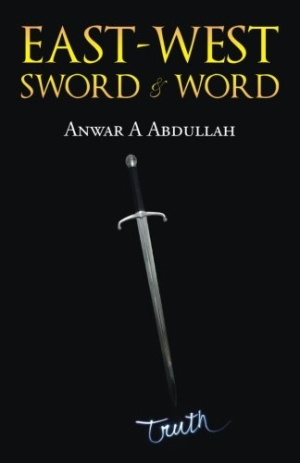East-West Sword and Word
East-West Sword and Word is an inspiring and thorough treatise on spiritual evolution.
Anwar A. Abdullah takes on the formidable task of condensing the arc of human history into a single book in his new spiritual treatise East-West Sword and Word. Drawing on the writings of and about great thinkers and heroes, from Einstein to Gilgamesh, Abdullah explores the connections between “ideals and reality, strengths and weaknesses, morals and ideas, creative and destructive wills, taking and giving, sacrifices and massacres, virtues and vices, and written and unwritten key moments.”
At the center of the book is a question: How do people become “good” and develop a moral compass? Each of the essays in this collection addresses that inquiry from a different angle. From holy conflict to religionism and tribalism to civilization, Abdullah makes the case that the human race continues to evolve toward the highest good.
He examines the relationship between humanity’s purported origins and its potential outcomes, always taking into account each culture’s diversity of thought and technology. “Since everything exists in dynamic relation to something else, the history of humanity is an interweaving of unseen threads,” Abdullah says. It’s identifying the underlying pattern that reveals the core of what makes us human.
The book is incredibly ambitious, and sometimes its reach exceeds its grasp. Abdullah’s extensive index reveals serious research, and he is omnivorous in his inclusion of source material. A passage from the Hebrew Bible appears next to a quote from H. G. Wells. It’s a lot to take in, and long, dense paragraphs offer little space to pause and think. Abdullah’s approach is an intellectual barrage—one idea quickly follows the other, and although there are plenty of examples of the concepts discussed in the text, insufficient exposition may leave some readers floundering.
However, Abdullah’s aptitude with his subject makes East-West Sword and Word worth the effort. His writing about the origins of civilization and the history of the Indus Valley, the Sumerians, and early Mesopotamia is excellent; the history of thought isn’t as easy to trace as the geographical and cultural changes in the landscape that inspired it.
“A dreadful drought looms over modern hearts,” Abdullah says. Essentially, East-West Sword and Word is a treatise on spiritual evolution. Why has our moral progress slowed while technology allows us to vault massive obstacles? How do we restore our focus on spirituality instead of materialism? Abdullah’s devotion to his subject is inspiring and is certain to cast light on this critical, provocative topic.
Reviewed by
Claire Foster
Disclosure: This article is not an endorsement, but a review. The publisher of this book provided free copies of the book and paid a small fee to have their book reviewed by a professional reviewer. Foreword Reviews and Clarion Reviews make no guarantee that the publisher will receive a positive review. Foreword Magazine, Inc. is disclosing this in accordance with the Federal Trade Commission’s 16 CFR, Part 255.

